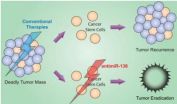(Press-News.org) WCS invests in a diverse array of long term, seascape-scale and species-focused conservation strategies across the waters of 20 countries and all five oceans. We inspire millions to take action for the oceans through the New York Aquarium and all our parks in New York City. To achieve our long-term conservation goals, WCS marine conservationists work with local and national governments, as well as an array of partners to improve management of coastal fisheries, mitigate key threats to marine species, expand effective marine protected areas, enhance ocean industry sustainability, and help people and wildlife adapt to climate change. Collectively, these efforts by WCS build a broader and deeper public understanding, advance scientific knowledge, and strengthen political commitment to our oceans.
INFORMATION:
Note to Editors:
Deutsche Elasmobranchier-Gesellschaft (DEG), Humane Society International (HSI), Project AWARE Foundation, Shark Advocates International (SAI), the Shark Trust, WildAid, and Wildlife Conservation Society (WCS), with the support of Oceans 5, are working together to secure CITES listings for shark and ray species at the 16th Conference of Parties in March 2013.
The Wildlife Conservation Society saves wildlife and wild places worldwide. We do so through science, global conservation, education and the management of the world's largest system of urban wildlife parks, led by the flagship Bronx Zoo. Together these activities change attitudes towards nature and help people imagine wildlife and humans living in harmony. WCS is committed to this mission because it is essential to the integrity of life on Earth. Visit www.wcs.org.
CONTACT: MARY DIXON (1-347-675-2294; mdixon@wcs.org)
STEPHEN SAUTNER: (1-718-220-3682; ssautner@wcs.org)
JOHN DELANEY: (1-718-220-3275; jdelaney@wcs.org)
Shark rules need teeth, groups tell IUCN
2012-09-04
ELSE PRESS RELEASES FROM THIS DATE:
Review finds some evidence for 'chemo brain' in breast cancer survivors, Moffitt Cancer Center says
2012-09-04
A large meta-analysis conducted by researchers at Moffitt Cancer Center has concluded that breast cancer patients treated with chemotherapy are at risk for mild cognitive deficits after treatment. The meta-analysis, or analytic review of previously published studies, found that study participants on average had mild impairments in verbal abilities (such as difficulty choosing words) and visuospatial abilities (such as getting lost more easily). The study noted that cognitive functioning varies across survivors, with some reporting no impairments and others reporting more ...
A*STAR scientists discover potential drug for deadly brain cancer
2012-09-04
1. A*STAR scientists have identified a biomarker of the most lethal form of brain tumours in adults- glioblastoma multiforme. The scientists found that by targeting this biomarker and depleting it with a potential drug, they were able to prevent the progression and relapse of the brain tumour.
2. This research was conducted by scientists at A*STAR's Institute of Medical Biology led by Dr Prabha Sampath, Principal Investigator, in collaboration with A*STAR's Bioinformatics Institute (BII), and clinical collaborators from Medical University of Graz, Austria, and National ...
Experts propose 'cyber war' on cancer
2012-09-04
HOUSTON -- (Sept. 4, 2012) -- In the face of mounting evidence that cancer cells communicate, cooperate and even engage in collective decision-making, biophysicists and cancer researchers at Rice University, Tel Aviv University and Johns Hopkins University are suggesting a new strategy for outsmarting cancer through its own social intelligence.
"We need to get beyond the notion that cancer is a random collection of cells running amok," said Herbert Levine, co-director of Rice's Center for Theoretical Biological Physics (CTBP) and co-author of the cover article in this ...
Every atom counts in graphene formation
2012-09-04
HOUSTON – (Sept. 4, 2012) – Like tiny ships finding port in a storm, carbon atoms dock with the greater island of graphene in a predictable manner. But until recent research by scientists at Rice University, nobody had the tools to make that kind of prediction.
Electric current shoots straight across a sheet of defect-free graphene with almost no resistance, a feature that makes the material highly attractive to engineers who would use it in things like touchscreens and other electronics, said Rice theoretical physicist Boris Yakobson. He is co-author of a new paper about ...
More than 70% of electronic waste management is uncontrolled
2012-09-04
Almost three quarters of disposed electrical household appliances in Spain are processed out of the Integrated Waste Management System (SIG). A study at the University of Salamanca exposes how many manufacturers are not registered in the established waste management system and avoid payment.
According to the European directive on waste electrical and electronic equipment, manufacturers of such products should recycle the waste they generate during their activity until reaching an annual level of 4 kg per inhabitant. However, in Spain the majority of unused equipment is ...
Major world interests at stake in Canada's vast Mackenzie River Basin
2012-09-04
The governance of Canada's massive Mackenzie River Basin holds enormous national but also global importance due to the watershed's impact on the Arctic Ocean, international migratory birds and climate stability, say experts convening a special forum on the topic.
"Relevant parties in western Canada have recognized the need for a multi-party transboundary agreement that will govern land and water management in the Mackenzie River watershed. Successful collaboration will effectively determine the management regime for a watershed covering 1.8 million square kilometers or ...
Annals of Internal Medicine tip sheet for Sept. 4, 2012
2012-09-04
1. No Nutritional or Safety Differences Between Organic and Conventional Foods
There is generally no difference in nutritional value or risk for bacterial contamination between organic and conventional foods, according to a new study being published in Annals of Internal Medicine, the flagship journal of the American College of Physicians (ACP). While the consumption of organic fruits and vegetables reduced exposure to any detectable pesticide residues by 30 percent, pesticide levels were generally within the allowable limits for safety.
Researchers conducted a systematic ...
Even in normal range, high blood sugar linked to brain shrinkage
2012-09-04
MINNEAPOLIS – People whose blood sugar is on the high end of the normal range may be at greater risk of brain shrinkage that occurs with aging and diseases such as dementia, according to new research published in the September 4, 2012, print issue of Neurology®, the medical journal of the American Academy of Neurology.
"Numerous studies have shown a link between type 2 diabetes and brain shrinkage and dementia, but we haven't known much about whether people with blood sugar on the high end of normal experience these same effects," said study author Nicolas Cherbuin, ...
Little evidence of health benefits from organic foods, Stanford study finds
2012-09-04
STANFORD, Calif. — You're in the supermarket eyeing a basket of sweet, juicy plums. You reach for the conventionally grown stone fruit, then decide to spring the extra $1/pound for its organic cousin. You figure you've just made the healthier decision by choosing the organic product — but new findings from Stanford University cast some doubt on your thinking.
"There isn't much difference between organic and conventional foods, if you're an adult and making a decision based solely on your health," said Dena Bravata, MD, MS, the senior author of a paper comparing the nutrition ...
Tigers take the night shift to coexist with people
2012-09-04
Tigers don't have a reputation for being accommodating, but a new study indicates that the feared and revered carnivores in and around a world-renowned park in Nepal are taking the night shift to better coexist with their human neighbors.
The revelation that tigers and people are sharing exactly the same space – such as the same roads and trails – of Chitwan National Park flies in the face of long-held convictions in conservation circles. It also underscores how successful conservation efforts need sciences that takes into account both nature and humans.
"As our planet ...






